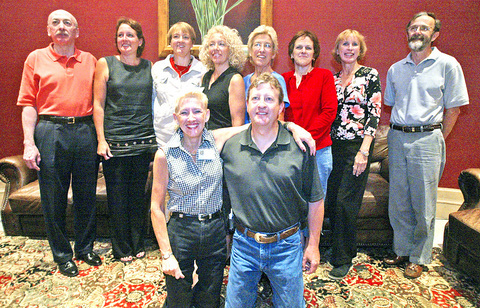Mike Slabaugh doesn't have a stomach. Neither do his 10 cousins.
Growing up, they watched helplessly as a rare hereditary stomach cancer killed their grandmother and some of their parents, aunts and uncles.
Determined to outsmart the cancer, they turned to genetic testing. Upon learning they had inherited grandmother Golda Bradfield's flawed gene, they had two options: Risk the odds that they might not develop cancer, with a 70 percent chance they would; or have their stomachs removed. The latter would mean a challenging life of eating very little, very often.

PHOTO: AP
All the cousins chose the operation. Doctors say they're the largest family to have preventive surgery to protect themselves from hereditary stomach cancer.
"We're not only surviving, we're thriving," said Slabaugh 16 months after his operation at Stanford University Medical Center in Palo Alto, California.
Advances in genetic testing are increasingly giving families with bad genes a chance to see the future, sometimes with the hope of pre-emptive action.
Slabaugh, who lives in Dallas, Texas, reunited with his many scattered cousins recently in Las Vegas just two months after the last in the group -- Bill Bradfield of Farmington, New Mexico -- had his operation. Several hadn't seen each other for decades while others met for the first time.
"Rather than live in fear, they tackled their genetic destiny head-on," said Dr. David Huntsman of the University of British Columbia, who found the gene mutation in the family.
The form of stomach cancer that runs in the Bradfield family, called hereditary diffuse gastric cancer, is extremely rare with about 100 families diagnosed worldwide.
The CDH1 gene mutation was first discovered in 1998 in a large New Zealand family with a history of stomach cancer. Those with the mutation have a 70 percent risk of stomach cancer.
It killed Golda Bradfield in 1960. She passed the faulty gene to seven of her children. Six died of the disease in their 40s and 50s.
The grandchildren learned of the defective gene after one of them, David Allen, died of stomach cancer in 2003. His doctor had sent a blood sample to Huntsman's lab, which confirmed the mutation.
Soon after, the remaining 17 got tested. Eleven who had the bad gene had surgery.
"I wake up every morning and think, `This is a free day. I get a bonus today,'" Slabaugh, 52, said.
During surgery, doctors remove the entire stomach and surrounding lymph nodes and attach the bottom of the esophagus to the intestine to create a pouch. Without a stomach, patients typically lose significant weight and must eat smaller meals more often.
While the stomachs of all six of the cousins who were operated on at Stanford looked normal before surgery, a study of the tissue revealed early tumor growths, said Dr. Jeff Norton, the surgeon.

SECURITY: As China is ‘reshaping’ Hong Kong’s population, Taiwan must raise the eligibility threshold for applications from Hong Kongers, Chiu Chui-cheng said When Hong Kong and Macau citizens apply for residency in Taiwan, it would be under a new category that includes a “national security observation period,” Mainland Affairs Council (MAC) Minister Chiu Chui-cheng (邱垂正) said yesterday. President William Lai (賴清德) on March 13 announced 17 strategies to counter China’s aggression toward Taiwan, including incorporating national security considerations into the review process for residency applications from Hong Kong and Macau citizens. The situation in Hong Kong is constantly changing, Chiu said to media yesterday on the sidelines of the Taipei Technology Run hosted by the Taipei Neihu Technology Park Development Association. With

CARROT AND STICK: While unrelenting in its military threats, China attracted nearly 40,000 Taiwanese to over 400 business events last year Nearly 40,000 Taiwanese last year joined industry events in China, such as conferences and trade fairs, supported by the Chinese government, a study showed yesterday, as Beijing ramps up a charm offensive toward Taipei alongside military pressure. China has long taken a carrot-and-stick approach to Taiwan, threatening it with the prospect of military action while reaching out to those it believes are amenable to Beijing’s point of view. Taiwanese security officials are wary of what they see as Beijing’s influence campaigns to sway public opinion after Taipei and Beijing gradually resumed travel links halted by the COVID-19 pandemic, but the scale of

A US Marine Corps regiment equipped with Naval Strike Missiles (NSM) is set to participate in the upcoming Balikatan 25 exercise in the Luzon Strait, marking the system’s first-ever deployment in the Philippines. US and Philippine officials have separately confirmed that the Navy Marine Expeditionary Ship Interdiction System (NMESIS) — the mobile launch platform for the Naval Strike Missile — would take part in the joint exercise. The missiles are being deployed to “a strategic first island chain chokepoint” in the waters between Taiwan proper and the Philippines, US-based Naval News reported. “The Luzon Strait and Bashi Channel represent a critical access

Pope Francis is be laid to rest on Saturday after lying in state for three days in St Peter’s Basilica, where the faithful are expected to flock to pay their respects to history’s first Latin American pontiff. The cardinals met yesterday in the Vatican’s synod hall to chart the next steps before a conclave begins to choose Francis’ successor, as condolences poured in from around the world. According to current norms, the conclave must begin between May 5 and 10. The cardinals set the funeral for Saturday at 10am in St Peter’s Square, to be celebrated by the dean of the College